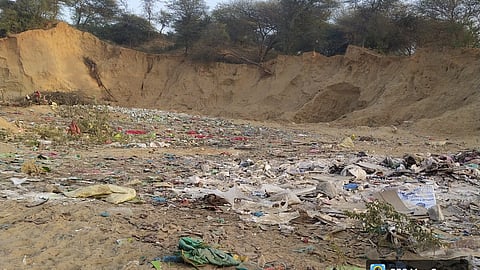More than 100 illegal waste sites flagged in Haryana Aravallis, citizens demand ‘No-Go-Area’ designation
CHANDIGARH: Demanding the declaration of ‘No-Go-Area’ zones for waste dumping, burning and landfills, over 100 geo-tagged locations across five districts of Haryana, Gurugram, Faridabad, Nuh, Rewari and Charkhi Dadri, have been highlighted in the second part of the State of the Haryana Aravallis: Citizens’ Report.
The Aravalli mountain range, estimated to be over two billion years old, is under serious threat due to rampant violations, according to the report submitted by the ‘People for Aravallis’ group to Union Minister for Environment, Forest and Climate Change Bhupender Yadav and Haryana Chief Minister Nayab Singh Saini.
Neelam Ahluwalia, Founder Member of People for Aravallis, said the report underscores how illegal industrial waste burning continues in several villages despite a blanket ban imposed by the Nuh Deputy Commissioner in early May this year on open waste burning within the ecologically fragile Aravalli region.
“The report highlights how, in direct violation of the blanket ban imposed by Nuh Deputy Commissioner in early May this year on open waste burning within the ecologically fragile Aravalli region, alleged illegal industrial waste burning continues in Khori Khurd, Khori Kalan, Sonari, Gurnawat, Rangala, Naharpur, Sewka and other villages in Tauru, which is resulting in severe air, soil and groundwater pollution,” she said.
“It also throws light on the pollution being caused in the eco-sensitive Aravalli region as a result of the infamous Bandhwari landfill and a landfill site near ITI Colony on the old Sohna-Alwar road, where mixed waste is being dumped daily. Regular fires at both landfill sites in the Gurugram Aravallis emit dangerous toxins, as organic waste, e-waste, plastic, chemicals and hazardous waste are all burnt together, adding to Delhi-NCR’s and Haryana’s air pollution, heat index and climate sensitivity,” she claimed.
She further said, “The report also highlights how, over the last few years, hazardous solid waste from the Bandhwari landfill and other kinds of waste have been dumped in mining quarries and forest areas across many locations in the Gurugram and Faridabad Aravallis, contaminating the soil, surface and groundwater in NCR’s lifeline for clean air, water recharge and wildlife habitat. The Centre for Science and Environment (CSE) had tested samples of the solid waste from the Bandhwari landfill dumped in one of the Aravalli forest areas near the landfill and found a high concentration of pathogens and toxic metals.”
“Dumped waste lying in 100-plus locations across five districts of the state where the Aravalli range runs, as mentioned in the report, must be removed from these eco-sensitive areas immediately and disposed of in a responsible manner. It is critical to establish a mechanism for strict monitoring and accountability, which is completely lacking at this point, in order to bring any positive change to the current extremely dismal health of the Aravallis,” she said.
Neelam added, “We urge the government to constitute Aravalli Protection Task Force Committees in all the Aravalli districts, headed by the DC of each district under the supervision of the Chief Secretary. Strict accountability with severe consequences is a must to ensure that government officials do their job without neglect and in a proactive manner to safeguard the Aravallis, so that our cattle, wildlife and people in the Aravalli districts in Haryana can live with dignity, without gasping for breath, drinking toxic water and being sick.”
Dr Rajendra Singh, the globally renowned water conservationist, said, “Aquifers lying beneath the Aravallis are interconnected and any disturbance or alterations in the pattern due to toxic landfills and waste dumping can significantly alter the purity of the groundwater table. Aravallis need to be declared as a No-Go area for waste dumping, burning, landfills and waste plants, as we cannot afford to pollute our green lungs, critical water recharge zones and wildlife habitats any further.”
Dr Shyamala Mani, Senior Waste Management Expert who works as Senior Advisor at the Centre for Chronic Disease Control and is a former professor at the National Institute of Urban Affairs, said, “Sustainable waste management is the need of the hour. No fresh, mixed waste should go to the existing landfill sites in the Aravallis. Focus must be on decentralised waste management, source segregation and maximum resource recovery from waste, so that minimal waste goes to the landfills, which must be set up outside the eco-sensitive Aravalli region. The use of single-use plastic items must be banned in all the Aravalli districts.”
Earlier, a month ago, Part 1 of the Citizens’ Report, which focused on the worrying state of the Aravallis due to rampant mining, deforestation and illegal encroachments, was submitted.

